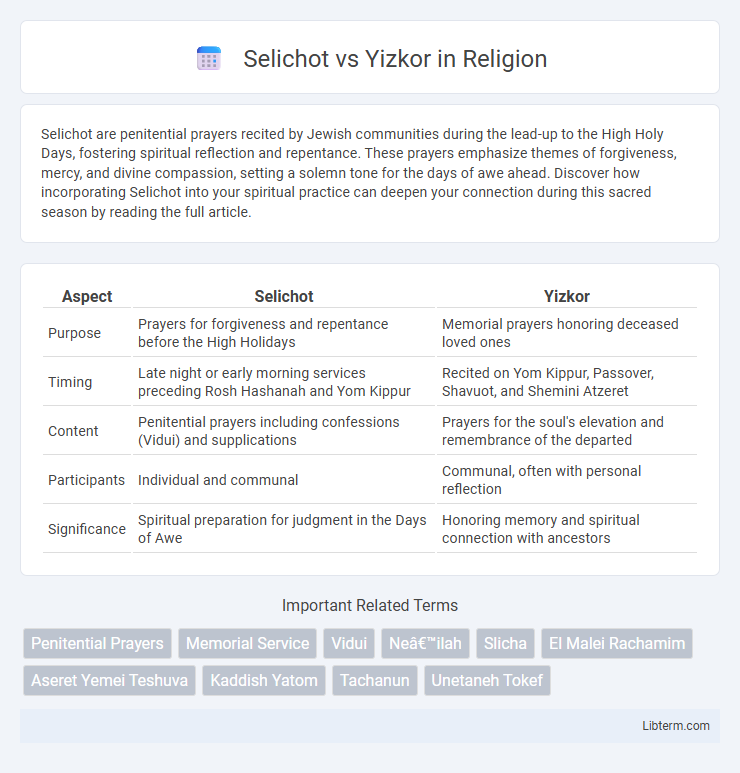Selichot are penitential prayers recited by Jewish communities during the lead-up to the High Holy Days, fostering spiritual reflection and repentance. These prayers emphasize themes of forgiveness, mercy, and divine compassion, setting a solemn tone for the days of awe ahead. Discover how incorporating Selichot into your spiritual practice can deepen your connection during this sacred season by reading the full article.
Table of Comparison
| Aspect | Selichot | Yizkor |
|---|---|---|
| Purpose | Prayers for forgiveness and repentance before the High Holidays | Memorial prayers honoring deceased loved ones |
| Timing | Late night or early morning services preceding Rosh Hashanah and Yom Kippur | Recited on Yom Kippur, Passover, Shavuot, and Shemini Atzeret |
| Content | Penitential prayers including confessions (Vidui) and supplications | Prayers for the soul's elevation and remembrance of the departed |
| Participants | Individual and communal | Communal, often with personal reflection |
| Significance | Spiritual preparation for judgment in the Days of Awe | Honoring memory and spiritual connection with ancestors |
Introduction to Selichot and Yizkor
Selichot are penitential prayers recited during the days leading up to the High Holy Days, emphasizing repentance, forgiveness, and spiritual preparation. Yizkor, meaning "remembrance," is a memorial prayer offered for deceased loved ones during Yom Kippur, Passover, Shavuot, and Shemini Atzeret, focusing on honoring and elevating their souls. Both prayers hold significant roles in Jewish liturgy, serving distinct yet complementary spiritual purposes of introspection and remembrance.
Historical Origins of Selichot
Selichot are penitential prayers with ancient origins tracing back to the Geonic period, developed as early as the 7th century in Babylonian Jewish communities to seek divine forgiveness before the High Holidays. These prayers incorporate poetic piyyutim composed by medieval poets such as Saadia Gaon and are recited during late-night services in the month of Elul or early Tishrei. In contrast, Yizkor memorial prayers originated in medieval Ashkenazi communities as post-Holiday remembrances for deceased relatives, solidifying as a tradition during Passover, Shavuot, Yom Kippur, and Shemini Atzeret.
Historical Origins of Yizkor
Yizkor originated during the Middle Ages as a memorial prayer recited for deceased relatives and communal leaders, reflecting a deep-rooted Jewish tradition of honoring the dead. The prayer service became embedded in Ashkenazi synagogue liturgy, particularly on Yom Kippur, Shemini Atzeret, Pesach, and Shavuot, symbolizing collective memory and spiritual elevation. Selichot, by contrast, are penitential prayers seeking forgiveness, emphasizing repentance rather than memorialization.
Purpose and Significance of Selichot
Selichot are penitential prayers recited before the High Holidays, focusing on seeking forgiveness and spiritual purification to prepare individuals for Yom Kippur. Their purpose is to inspire reflection, repentance, and a renewed commitment to ethical living, emphasizing the themes of mercy and divine compassion. Unlike Yizkor, which is a memorial prayer honoring deceased loved ones, Selichot centers on personal and communal atonement and spiritual readiness.
Purpose and Significance of Yizkor
Yizkor is a memorial prayer recited to honor and remember deceased loved ones, emphasizing spiritual elevation and communal remembrance within Jewish tradition. Unlike Selichot, which focuses on penitence and seeking forgiveness during the High Holy Days, Yizkor serves as a solemn reflection on mortality and the enduring connection between the living and the dead. Its significance lies in fostering memory preservation and spiritual merit for the departed, reinforcing a sense of continuity and collective memory in synagogue services on Yom Kippur, Passover, Shavuot, and Shemini Atzeret.
Key Prayers and Liturgical Elements
Selichot prayers emphasize penitential confessions and supplications for forgiveness, featuring repetitive recitations of the "Avinu Malkeinu" and specific piyyutim such as "Maalat Chachamim," set to evoke introspection and repentance. Yizkor services center around memorial prayers for the deceased, including readings from Scripture and the recitation of the "El Maleh Rachamim" and "Kaddish Yatom," which honor the souls of departed loved ones. Both liturgical elements highlight communal participation but differ in thematic focus--Selichot on seeking divine mercy before the High Holidays, Yizkor on remembrance during festivals like Yom Kippur, Passover, and Shavuot.
Timing and Occasions for Recitation
Selichot prayers are recited during the days leading up to Rosh Hashanah, particularly late at night or early morning, to seek forgiveness and prepare spiritually for the High Holy Days. Yizkor, a memorial prayer honoring deceased loved ones, is said on specific Jewish holidays such as Yom Kippur, Shemini Atzeret, Passover, and Shavuot. The timing of Selichot centers on penitential reflection before the New Year, while Yizkor is tied to commemorative occasions within the synagogue service.
Customs and Practices Associated with Selichot
Selichot prayers, recited before the High Holidays, involve penitential poems and supplications seeking divine forgiveness, typically said late at night or early morning. Customarily, communities gather in synagogues for these solemn services containing repetitive confessions and heartfelt pleas, often accompanied by the blowing of the shofar in Sephardic traditions. The practices contrast with Yizkor, a memorial service recited on specific holidays to honor deceased loved ones, emphasizing remembrance rather than repentance.
Customs and Practices Associated with Yizkor
Yizkor is a memorial prayer recited four times a year in Jewish tradition, specifically on Yom Kippur, Shemini Atzeret, Passover, and Shavuot, honoring deceased loved ones through communal remembrance. The custom includes lighting candles, giving charity (tzedakah), and personal prayer, emphasizing reflection and spiritual connection with the departed. Unlike Selichot, which centers on penitential prayers and requesting forgiveness before the High Holy Days, Yizkor focuses on memorializing and expressing the ongoing bond with the souls of the deceased.
Comparing the Spiritual Impact of Selichot and Yizkor
Selichot prayers intensify spiritual cleansing and repentance by invoking divine mercy before the High Holidays, fostering profound introspection and humility. Yizkor, recited during Jewish festivals, emphasizes memory and connection to departed loved ones, providing comfort through communal remembrance and spiritual elevation. Both practices deepen the soul's relationship with God but serve distinct purposes: Selichot focuses on individual repentance, while Yizkor centers on honoring and sustaining the souls of the deceased.
Selichot Infographic

 libterm.com
libterm.com